Requesting party and partners
Kyambogo University (KYU)
Bukalasa Agricultural College (BAC) TVET
Consortium partners Q-Point
Maastricht School Of Management (MSM)
Inholland University of Applied Sciences (Educational institution)
Ecopolis Europa Private sector
Egerton University – Kenya University













